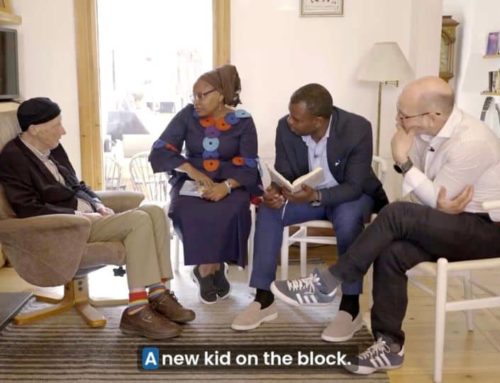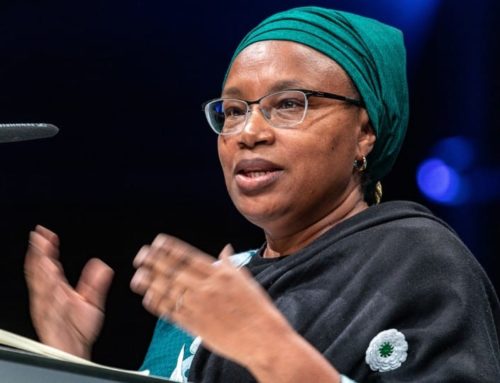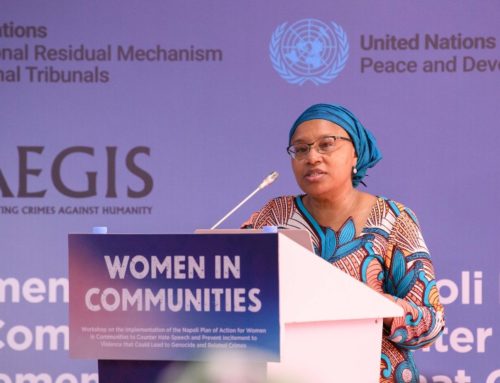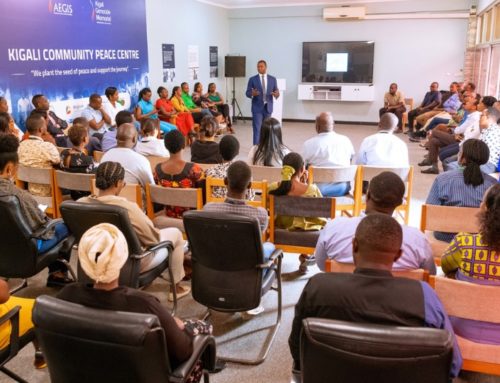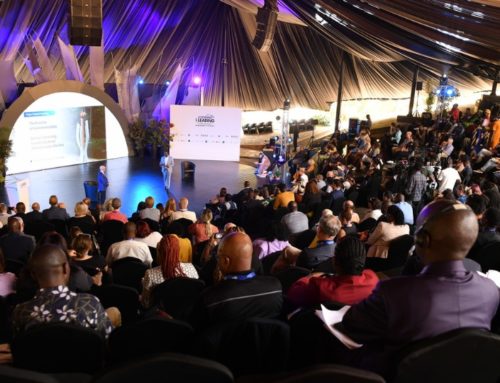 17 Oct 06 – A defector from the ‘Janjaweed’ Arab militia in Darfur, first interviewed by the Aegis Trust, features in tonight’s editions of BBC Newsnight and tomorrow’s edition of The Times.
17 Oct 06 – A defector from the ‘Janjaweed’ Arab militia in Darfur, first interviewed by the Aegis Trust, features in tonight’s editions of BBC Newsnight and tomorrow’s edition of The Times.
For his own safety and the safety of his family in Darfur, the defector’s name is withheld and his face is masked. Although he was operating as part of the Janjaweed killing machine at the lowest level, he offers some of the most compelling evidence of the Sudanese Government’s commission of these crimes in Darfur yet presented.
“This is the first time that someone involved in perpetrating ethnic cleansing has come forward to admit to it while the operation is still in progress,” says Dr James Smith, Chief Executive of the Aegis Trust. “What this man is able to tell us confirms that the Sudanese Government has been lying through its teeth. Far from its claims to have nothing to do with the Janjaweed, it has recruited, organised, trained, armed, funded and directed its operations from the outset. One of the most striking aspects of these revelations is the Janjaweed’s ability to call in airstrikes, and their systematic approach to doing so. It highlights the urgency of the need for the international community to immediately implement and monitor the UN-authorised no-fly zone over Darfur.”
Footage of Aegis’ interview with the Janjaweed defector will be available on this site shortly.
A partial transcript of Aegis’ interview is available below.
CLICK HERE for a Mandarin (Chinese) translation of the interview.
How did you get involved in the Janjaweed?
The militia was started on orders from the Government.
There are certain people who recruit people to the Janjaweed.
Who trained you?
The government provides a number of people who train us.
The weapons are provided by the Government.
Where were you trained?
In a camp west of El Kabkabiya called Misteriha.
How were you trained?
It’s not a long course of training. Just to train you how to use the weapon. It’s not like in the military. They give you sufficient training.
They train you to recognise targets and to use certain weapons against those targets. They give you a certain type of weapon to use against those targets.
We were told about the villages. You cannot find people without villages. So we were trained to target those villages.
What was the first village that you attacked?
The first village was a village near Kutum called El Bus.
When was this?
It’s difficult to remember the months and particular dates, but I would say the year, it was in 2004.
Can you take me through the process of how an attack is carried out?
Firstly, we send a group to survey, to find out about if there are people in the village or not. Then the next step is to attack the entire village after surrounding it. We have to know whether there are people who are able to fight or not. If not, we will burn down the entire village.
Who gave you your orders?
The orders come directly from the Government, and they are to wipe out the entire village completely.
The Government will give the order to commanders and these commanders give orders to us.
If we learn that it’s a lot of people or a rather big village, and there may be fierce fighting, we have to call an airstrike to weaken them. Then we will attack. But if there are fewer people, and no opposition rebel groups, we will just attack.
Did you call an airstrike for Elbus?
For that village, there wasn’t any resistance. It was a small village.
What did you do to the people who lived there?
Many, many people were killed. Many, many were killed.
People have weapons, and they’re ignorant. The result, when people get to the village, everybody has a weapon to shoot everybody who you meet. You will not distinguish between children, the elderly or women, you just shoot and kill everybody. You can’t tell if this is an innocent person, or not fighting, you just kill everybody indiscriminately.
Were any people in this village burned in their houses?
In this village in particular, I did not see anybody being burned, but presumably if there were elderly people they must have died in the fires.
Did you take part in the killing? Are you aware that you personally killed people in this village?
Yes.
How old were the youngest children who were killed there?
Young.
Young children.
Four or five.
Was anyone raped in this village?
Rape can happen. Rape can happen. There are too many people. It depends, from one person to another. Some people rape, some do not.
Did it happen in this village?
Yes, it happened in this village.
Did you take part in rape?
No, I did not. No, I did not.
What incentives did the Government give you?
They give you a camel worth 2m Sudanese pounds. They tell you this camel is for you, and you will be on a monthly salary of 500,000 Sudanese pounds.
Were you allowed to keep what you looted on top of that?
Anything you looted, you were allowed to keep.
Were you told why you had to target these villages?
They don’t tell us this or that. You are well-armed, supported by the Government with weapons. You are meant to wipe out everything in front of you, village or no village, indiscriminately.
Were you told that you had to target these people because they were Africans?
Sometimes we do hear these things. Sometimes you hear, these are Africans and these are Arabs. And these places cannot live. Only certain tribes. These things, you can hear them.
Did you use slogans during attacks, such as ‘kill the blacks’, ‘kill the slaves’? We hear repeatedly from survivors that the Janjaweed shout such phrases.
Yes, all you have said, they said.
You hear sometimes, kill the blacks, kill the slaves, wipe them out. Allahu Akbar.
Did these slogans mean anything to you?
No it doesn’t mean anything to me. No, it doesn’t mean anything to me. Just we were fighting, with no object.
Honestly, to most of us it doesn’t mean anything. because they brought shepherds. They were shepherding camels, cows, animals. They brought them and trained them to fight. the slogans mean nothing to them. These are fighters, just fighters. They are saying the slogans, they don’t understand anything about it, they just go killing.
How many villages did you help to attack?
Many. Many.
Too many villages, I can’t tell you the numbers.
More than 50?
Possible. 50. 60.
What was the last village you attacked, and when was this?
The last village I remember that we attacked is west of Kutum, a village called Ein Farah. In 2005. Possibly November, September. My problem is, I went through a lot of difficulties, problems. I cannot remember dates.
What made you leave the Janjaweed?
I hate war. Honestly, I hate war; I hate Darfur. Its troubles are as many as the sands. To survive, your chances are one in a hundred. A long time ago, you could walk a long distance on foot; a week. You could face nothing, no problems. Nowadays you cannot walk even a few kilometres without facing a danger. Therefore I decided to leave Darfur forever.
What would happen to you if the Home Office sent you to Khartoum?
Khartoum is difficult, man. It’s full of Janjaweed. They come and go. They will see me, and this will ultimately appear on television and they will know from this. If I am taken to Khartoum, I will be endangered or possibly taken to Darfur to fight. And then they will persecute me, and I will be killed.
Of all you have seen and done, what has affected you the most?
The things that affected me the most were burning villages, and seeing civilians, children and elderly people die. And those who escaped, thirst and starvation would kill them because the distance they would have to travel was very long. This is what affected me most.
It’s sometimes said in the Arab world that the stories about Darfur are all American or Zionist propaganda. What would you say to people who believe this?
My message is that what happens in Darfur is real and is happening. They committed genocide, and they burned villages. Saying that what the international community says about this is wrong, this is wrong itself. The international community needs to do something about it.

